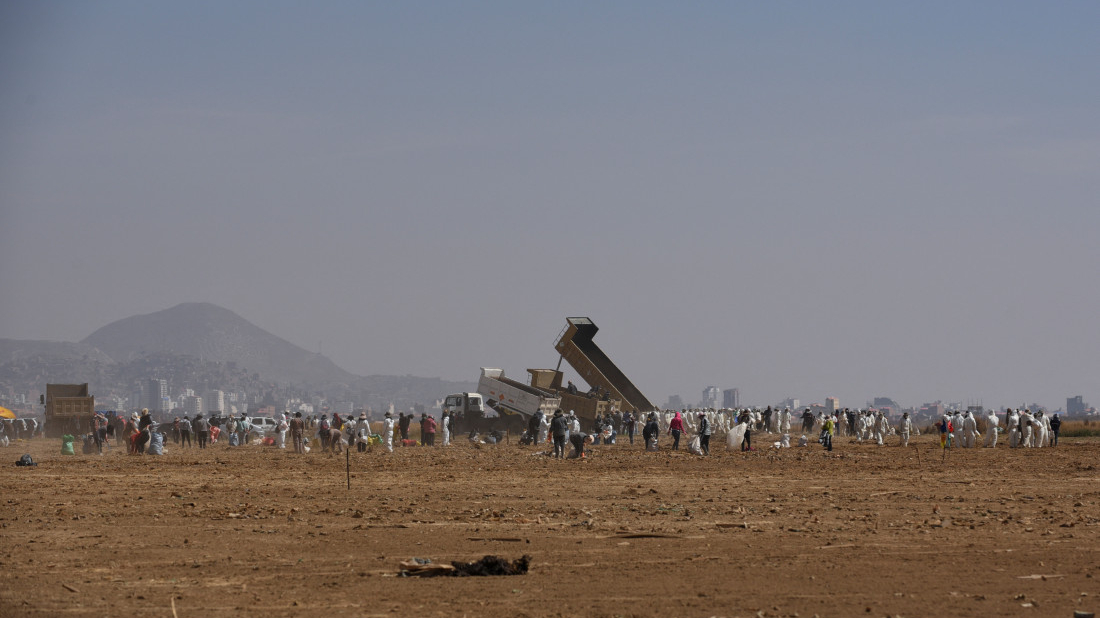Trump says he will raise global tariff rate from 10% to 15%
U.S. President Donald Trump said on Saturday (21 February) he will raise to 15% the temporary global tariff rate on imported goods imposed after the U...

Volunteers cleans-up the poluted lake Uru Uru in Bolivia highlands. Now flamingos can fly back to their homeland
Lake Uru Uru, located in the Bolivian highlands, was once a thriving sanctuary for flamingos and nearly 80 species of migratory birds. Today, its once-pristine banks are littered with garbage and waste, threatening the lake’s delicate ecosystem. However, local volunteers and eco-activists have been working tirelessly to restore this once-beautiful habitat.
"It used to be a lake. Our grandparents told us stories of hunting and fishing here. Now, it's become a lake of plastic bottles and garbage," says Florencio Aguilar, a leader of the indigenous Uru people who have lived near the lake for generations.
Since 2021, more than 19 hectares of the lake and its shores have been cleaned with the help of volunteers, including 50 members of the indigenous Uru community. They’ve relied on native reeds, called totora, known for their ability to absorb toxic metals and pollutants from the water. So far, over 3,000 totora reeds have been planted in the most polluted areas.
The impact has been significant. Lab tests have shown that in areas where the reeds were planted, pollution levels have dropped by 30%.
Once home to around 120,000 flamingos, the lake’s population has been reduced to half that number due to the degradation of the ecosystem. But thanks to the ongoing efforts, wildlife is gradually returning.
As the cleanup continues, more birds are finding their way back to the only remaining untouched sections of the lake.
Quentin Griffiths, co-founder of online fashion retailer ASOS, has died in Pattaya, Thailand, after falling from the 17th floor of a condominium on 9 February, Thai police confirmed.
At least four people have died and 17 others were injured after a liquid gas truck overturned and exploded in Santiago, Chile’s capital, authorities confirmed on Thursday. Police said the driver was among those killed.
Cubans are increasingly turning to solar power to keep businesses operating and basic household appliances running during prolonged electricity cuts, as fuel shortages make diesel generators and other temporary solutions more difficult and costly to maintain.
Ukraine’s National Paralympic Committee has announced it will boycott the opening ceremony of the Milano Cortina 2026 Paralympics in Verona on 6 March, citing the International Paralympic Committee’s decision to allow some Russian and Belarusian athletes to compete under their national flags.
Eric Dane, the actor best known for his roles in 'Grey’s Anatomy' and 'Euphoria', died on Thursday, at the age of 53 after a battle with amyotrophic lateral sclerosis (ALS). His family confirmed his death after what they described as a “courageous battle” with ALS.
The administration of U.S. President Donald Trump on Thursday (12 February) announced the repeal of a scientific finding that greenhouse gas emissions endanger human health, and eliminated federal tailpipe emissions standards for cars and trucks.
Tropical Cyclone Gezani has killed at least 31 people and left four others missing after tearing through eastern Madagascar, the government said on Wednesday, with the island nation’s second-largest city bearing the brunt of the destruction.
Rivers and reservoirs across Spain and Portugal were on the verge of overflowing on Wednesday as a new weather front pounded the Iberian peninsula, compounding damage from last week's Storm Kristin.
Morocco has evacuated more than 100,000 people from four provinces after heavy rainfall triggered flash floods across several northern regions, the Interior Ministry said on Wednesday.
Greenland registered its warmest January on record, sharpening concerns over how fast-rising Arctic temperatures are reshaping core parts of the island’s economy.
You can download the AnewZ application from Play Store and the App Store.

What is your opinion on this topic?
Leave the first comment